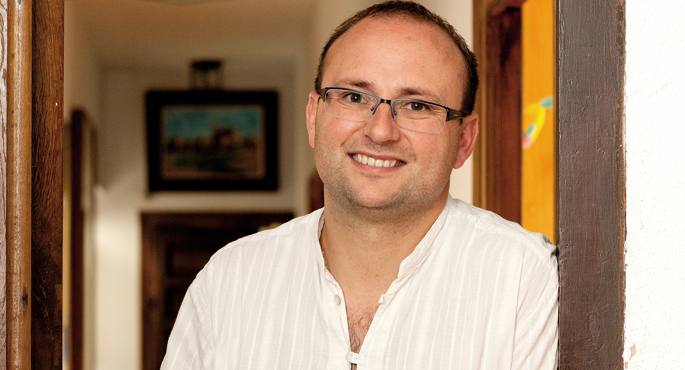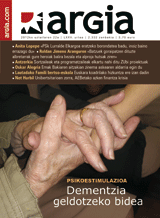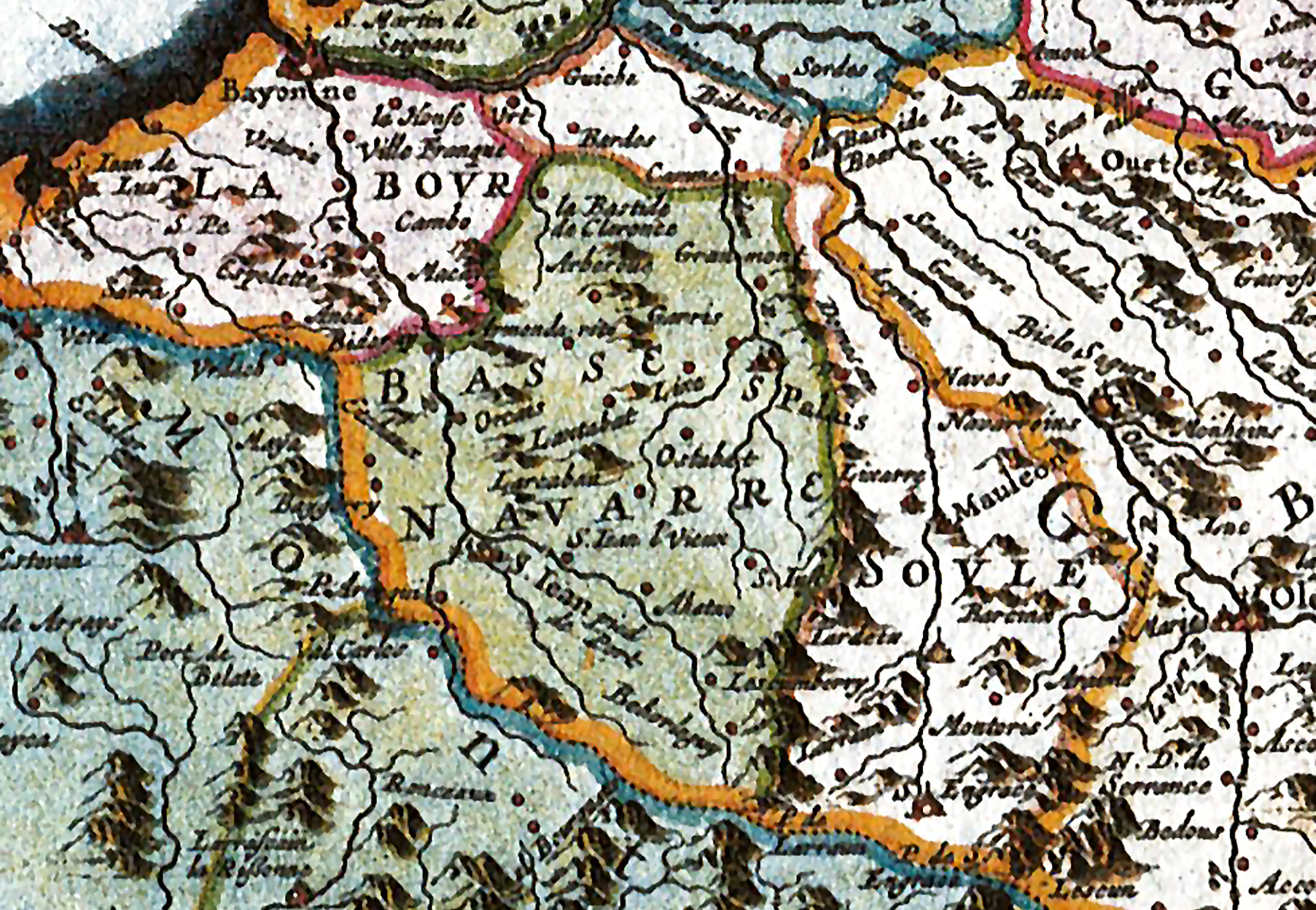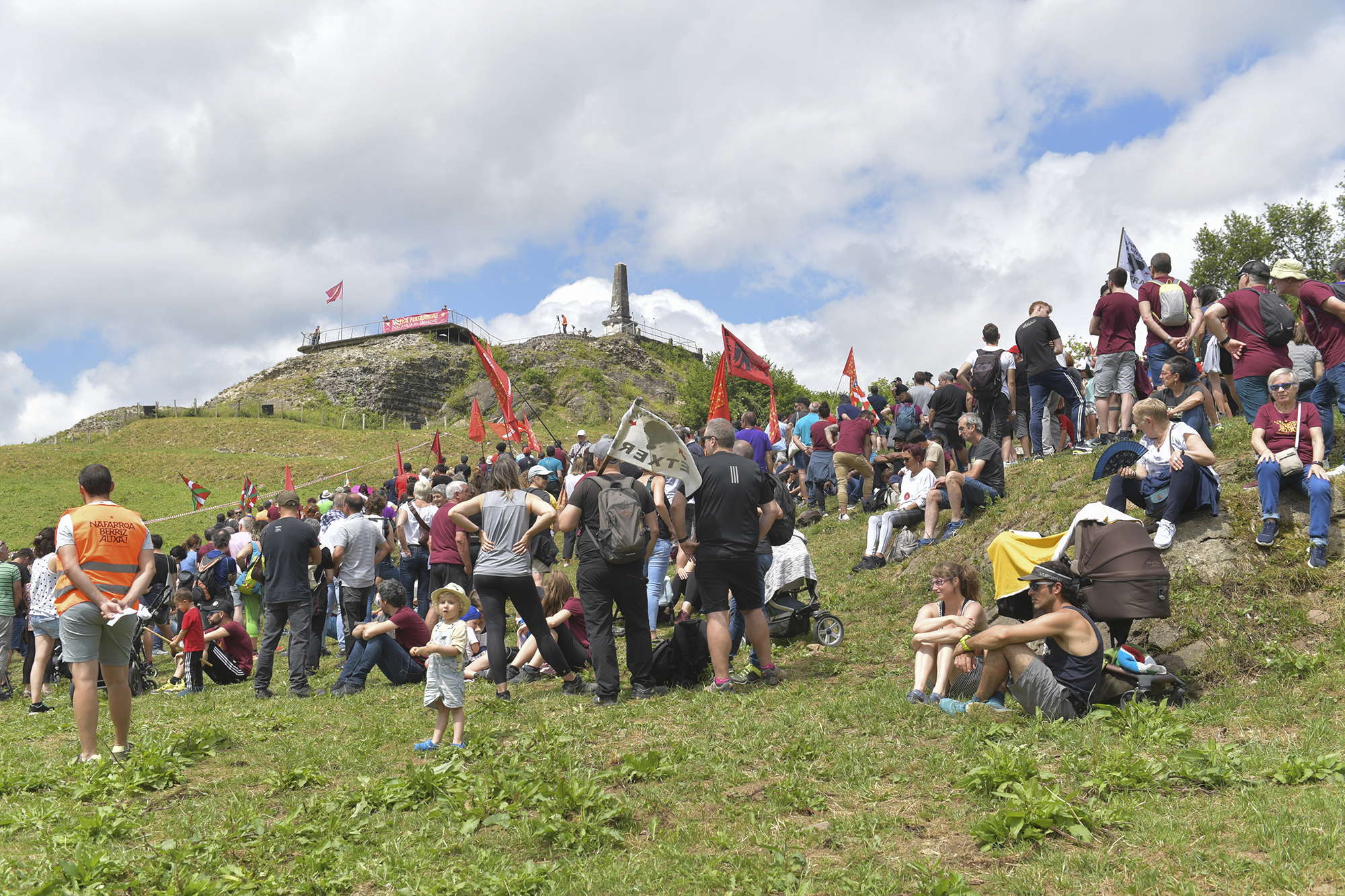"You can't fall into simple mystifications to build something politically modern."
- A young researcher who smells like naphthalene and takes away the dust from history. Furious worker and quite insomnia. The result of this combination is the great work it does.

You've always been the son of Jimeno Jurío, but now you're starting to be Roldan.
I'm very proud of my father, but it's true. When I started studying History, many people said to me “how good, like my father.” During adolescence he was quite awkward and Gamberra and in some subjects he had Insufficient. I was a great juerguist to UBI. So all of a sudden, I became a scholar, but not forgetting the juerga. At 16, I didn't think I had to study history, let alone at Opus University. When I was choosing the studies, I did see that the choices I liked the most were History. My intention was to go to Zaragoza, but my father got sick, at first we thought that what osteoporosis was was bone cancer. In such circumstances, and being a single son, I could not marcharme.En the 1970s his
father was denied the possibility of entering as a student at the University of Opus because he did not give a "profile" of historian. I also thought that there would be a difficult road, but it was just the opposite. Esperanza Aguirre gave me the third national end-of-career prize, made the thesis with Ángel Martín Duque and there I worked as a professor for a season. I don't regret anything. It's a very interesting experience to dive into another ecosystem. At that time my life was not limited to my studies and I was president of the Tiebas Council, for example.
What was your childhood like?
We lived in Pamplona. The mother's family is PTV (from Pamplona of All Life) and the father's family is from Artajona. Tiebas is between the two and this is where they took and restored this house [interview in his 17th-century house of Tiebas] when I was 7 years old. Since I was young I was on vacation and on weekends. When you're a child, you're not aware of the social dimension of your father or your mother. Once I remember, for example, that when Manuel de Irujo died we were in Estella and the Garaikoetxea car arrived, which was then lehendakari, with his little ikurriñas placed on the front. Garaikoetxea stood up and hugged his father in a very expressive way. I realized then that my father was someone. In my youth, I saw it as a reference point of culture and Euskera, like many people, but at the same time I wanted to be independent. I felt the pride of being your child later, when I started studying. It was very nice because she helped me a lot and when she started losing health I could also help her, especially on computer issues. We did some work together.
What topics have you selected for your PhD thesis?
I studied the birth of Christianity in Navarre in history. Due to the shortage of documentation of the 1st and 3rd centuries, I had to analyze the advocations of the churches in order to complete the map. The advocations of the churches, that is, the saints they are dedicated to, were determined in function of the fashions of the time and through them one can know how the new religion was introduced and spread in our scope. I made my doctoral thesis in Philosophy and Educational Sciences in the field of legal anthropology at the UPV/EHU and in Basque. I did it around forgetting the excerpts. He did not have much echo but he is there and I am very proud of it. I have another doctoral thesis registered, this third in law, the marriage of Navarre in history. I don't need that at all, and I do it because I like it. In this line of research I already had some works that I had already done and, in fact, it is very nice, morbid and pornographic.
Morboso?
Throughout history, marriage has been governed by canon law. After the Council of Trento, the Church is fully involved in the compulsory regulation of all areas of life. From before there were quite “liberal” places, like Navarre. In addition to canonical law, here was also a secular one that is very funny. For example, at the General Court it is said that when infantrymen lay with the woman, these men had the right to put the woman in bed without panties. Today it seems to us to be a barbarity of gender, but it must be put in place in due course. In an article recently published in a journal in Madrid I explained that in the Middle Ages in Navarre priests were married and I study the legal situation of these, their women, their children and even their lovers.
That in Navarre?
Very special things have happened here. Navarro civil law has been and is very conservative after Trento. It has a lot to do with opus. Let us think, for example, that when the divorce law was implemented in Spain here there were some intractable attitudes, because it was said that this was contrary to the Fuero de Navarra, that there was never here, etc. That is a trivial argument. Before Trento the situation is very different, varied and fun. From the point of view of women, their legal situation is quite interesting and curious in many respects. From the point of view of the history of law, very nice contributions can be made. For example, the formulas that were held privately before the Council and used in them are very nice and very valuable from the point of view of the Basque Country, as José María Satrustegi collected. Trento was the one who brought the wedding advertising.
You are familiar with the topic of Forum Enhancement in depth. Has it been as beneficial for Navarre as some say?
No, not much less. Jaime was the Ignatius of Burg and the game went very well. He was not interested in the reform appearing as a statute and a referendum, so his proposal was based on a supposed historicism invented by himself. When in the Middle Ages the outlaws changed or when in the Modern Age the kings swore for the smoker, they assured that they always had to wager on the improvement of the same. He made this approach, which was simply an improvement, negotiating with Martin Villa and pushing it forward. Totally undemocratic and legally bottomless. That's what we have here. As a result, nationalists were marginalised in the negotiations and the result is that we have a statute of autonomy made by the Navarros parties. The treatment of the Basque Country, for example, was subsequently approved by the Basque Law, hence it follows, and like that there are many more things. If you compare it with other autonomies with a high degree of self-government, they have all reviewed their status in one way or another and almost nothing has been touched on here. This shows the strong interest of UPN-PP and PSOE for not changing anything in Navarra.
This year is the 500th anniversary of the Conquest of Navarre and many people have become historian… From 16 to 18 July you will talk about it in the UEU in Pamplona and Elizondo.
The good thing that all the centenary celebrations have is that they bring a historiographical review. What surprised me is that a little historiographical innovation has been made about it. Someone has been very interesting, but not what one could expect: books, congresses with innovative ideas, researchers immersed in archives… Those few books that have been published, which are not a synthesis, have had very little repercussion. For example, in relation to the long trial for the conquest between the people of Artajona and the Count of Lerín, we published the book with all the research carried out by our father last year and no one has realized it. Goio Monreal and I drew a volume of 1,400 pages last year with an important collection of documents on the conquest, making a deep legal reflection, and there it is. The same is true from a Navarrist point of view. For example, Isabel Ostolaza and Ignacio Panizo do not mention the book that provides an interesting contribution. It's pretty disappointing. In this respect, this centenary is very scarce. The conferences that have been held, with the exception of a few presentations, have been rather bad, and I have sometimes participated in the organisation. In addition, many of them are completely sectarian. The picture is pretty gray from the point of view of a historian. Another thing is the popular movement that has generated this centenary, but that is a political reflection.
On the other hand, I was very sad to see that other centenarians, which I believe are more important, have been completely ignored and silenced. From the point of view of the Basque Country, for example, the adoption of the Cadiz Constitution of 1812 has been totally disfigured. This fact ended with the outbreaks of Navarre, Álava, Gipuzkoa and Bizkaia. That was the beginning of the end. Later, in the 19th century some excerpts were recovered, but the creation of Spanish nationalism is there and after the war of independence acquires legal personality with the Constitution of 1812. That was the end for Hego Euskal Herria. It is also very close to the parameters of the current policy and has not been given any importance.
I see you critical of the anniversary of the conquest.
I'm slightly embarrassed by the 1512 statolalist vision. We focus on the state and it is of great importance, but it must also be seen that in history there have been other institutions that have had greater and more direct importance for the people. The limits of the Church, for example, were of vital importance in the daily lives of the people, and they did not change with the Conquest until the arrival of Philip II.
It also gives me a huge rage, from the point of view of the history of the Basque Country: the conquest brought nothing good to the Basque Country, but the terrible decline did not come in the sixteenth century, but after the Corpus War, when the Bourbons arrived in the eighteenth century. In Euskal Herria our language suffered a severe blow and in America many languages also disappeared due to the absolutist centralism of the bourbons: “An empire, a language.”
In the movement that has been created around 512, history is being distorted in part. It looks like the world ended there. Then a lot of things happened. From the Basque point of view there have been very important people who have enthusiastically defended self-government and the Basque people, not just the Basques. If we put the end point in 1512 or 1521, we remove everything else that came next and that does not seem legitimate to me.
I'm a very Republican. We've always been Republicans by my mother's family, and I can't see kings. I have that in my DNA. Now, around conquest, some extol the Albret as our heroes and they were farms. They had huge economic interests. The brother of King Amadeo and the bishop of Pamplona, for example, fought for his economic interests and not for those of Navarre, where he had the help of his brother. What do we read about Henrike III.aren? They're becoming our hero. I can't do that! This king Henry III brought the Bourbon Dynasty to France and then brought it to France in the 18th century. Or Jaso Azpilikueta, the things that are said about the San Francisco family. What happened after the first generation? We can't build our imaginary about these ideas. If you want to build something politically modern, you can't fall into simple mystifications.
Together with Udalbide and Casa Pamiela, you are publishing the collection of complete works of the deceased father. How is it going?
45 copies have been edited and will be about 60 in total. I am very proud that this is the largest collection of full works by an author that has been made in the State. On the one hand there are the works he published in life and on the other the ones he kept at home. Approximately 40% is new. In many cases it is a very important material. Three examples: Sartagudo, the widowed people, is the town of Navarre and the entire Basque Country that suffered the most brutal repression of the post-war period. His analyses and testimonies have been of great importance for the historiography of the Civil War and the work was very successful. Another: the father made the road to Santiago in 1963, with the intention of reviving this road that was dead. He did extraordinary studies and reports for this, they appeared at the NODE. It is also an ethnographic work that counts, for example, how the miners of León, who are now so up-to-date, lived at that time. What poverty and how difficult life they had! And the third one. History of the Jesuit School of Pamplona. It's interesting to see the economic power they've had or their weight in the history of education.
Special pearls between what remains?
In the first half of the 1970s, his father dedicated himself to researching the festivities of the people. A small part of the information he used for parties and other jobs, but what hasn't been published is tremendous. That is what we have to do.
In the Bidegileak collection, he has published a book on Joxemiel Bidadores, who died two years ago.
It is difficult to differentiate a friend from his intellectual dimension. He did a great job in every field. Erudite and also polite, parranist, saltsero… One of his greatest contributions was the history of popular dance. The one who was going to be the thesis was stuck on the road by a malicious move that cut off access to university. This also has its good side, because being out of the university track was free to do what I wanted. That same thing happened to my father. The best known contribution of Bidadores was Materials for a history of Basque literature in Navarra (2004, Pamiela). Alexander Tapia Perurena, poet of Navarrería or Joxe Agerre and studies on journalism in Basque in Navarre from 1910. Until then it seemed to us that at that time there was no longer any talk in Basque in Iruñea, but there was a reduced but intense Basque atmosphere. Bidor, who had a close relationship with the Ribera, also performed beautiful works, demonstrating that in the nineteenth and twentieth centuries there was also a Basque atmosphere.
"Nahiko kuadrikulatua eta diziplinatua naiz. Egiten dudan lana gustatzen zait eta oso gustura nago. Baina badut sekretutxo bat: nahiko insomnea naizela. Hiru umerekin, gainera, hori eskertzen da. Nik ordu asko sartzen dut gauean, batez ere ikerketa lanetan. Ordu txikitako isiltasunean, bakardadean oso lasai egoten naiz".
1973ko ekainaren 3an Iruñean jaioa. José María Jimeno Jurío historialari ezagunaren eta Elena Arangurenen semea. Historian eta Zuzenbidean doktorea, Nafarroako Unibertsitate Publikoan Zuzenbidearen Historia eta Nafarroako Zuzenbidearen Historia ikasgaiak irakasten ditu. Hamabi libururen egilea da eta beste hamaika argitalpen, artikulu, kongresu, hitzaldi eta ikastarotan parte hartu du. Hirugarren tesia bidean du eta José María Jimeno Jurío aita zenaren lan osoen bilduma argitaratzen ari da Pamiela etxearekin elkarlanean. Hiru haur txikiren aita ere bada.
Immersed in the war against the community lords and churches, in 1521, Castile obtained the help of his brother-in-law Enrique de Navarra II.ak, King Francisco I of France, to recover the kingdom of Navarre invaded, conquered and occupied nine years earlier.
Parents Enrike... [+]
Memoria eta aldarrikapen eguna izan da larunbatean Amikuzeko hiriburuan. "Sekulan baino gehiago, gure izanetik aurkitu indarraz, bihar gu girena hazi", izan dira Zabalik elkarteko presidentearen hitzak, Nafarroa Bizirik eguneko ekitaldi ofizialean.
The ideological heirs of the conquerors of the Kingdom of Navarra are today the political parties that manage means such as patriarchal intellectual production and EITB. These heirs continue with the colonization process of Navarre, distorting historical contexts and negating... [+]
The castle of Amaiur (1522), in Baztán, was the last strength of the resistance against the Spanish conquest of the Kingdom of Navarra. The rebels, with their courage, also dominated the kingdom of Spain, challenged by their hearts, sought to rise up against the... [+]
You will easily see Spaniards of a certain age who want to underestimate or reduce the severity of something: “More was lost in Cuba,” recalling the loss of the remains of the colonial empire in 1898. Hungarians also have a similar expression, which is used in the same sense... [+]




















